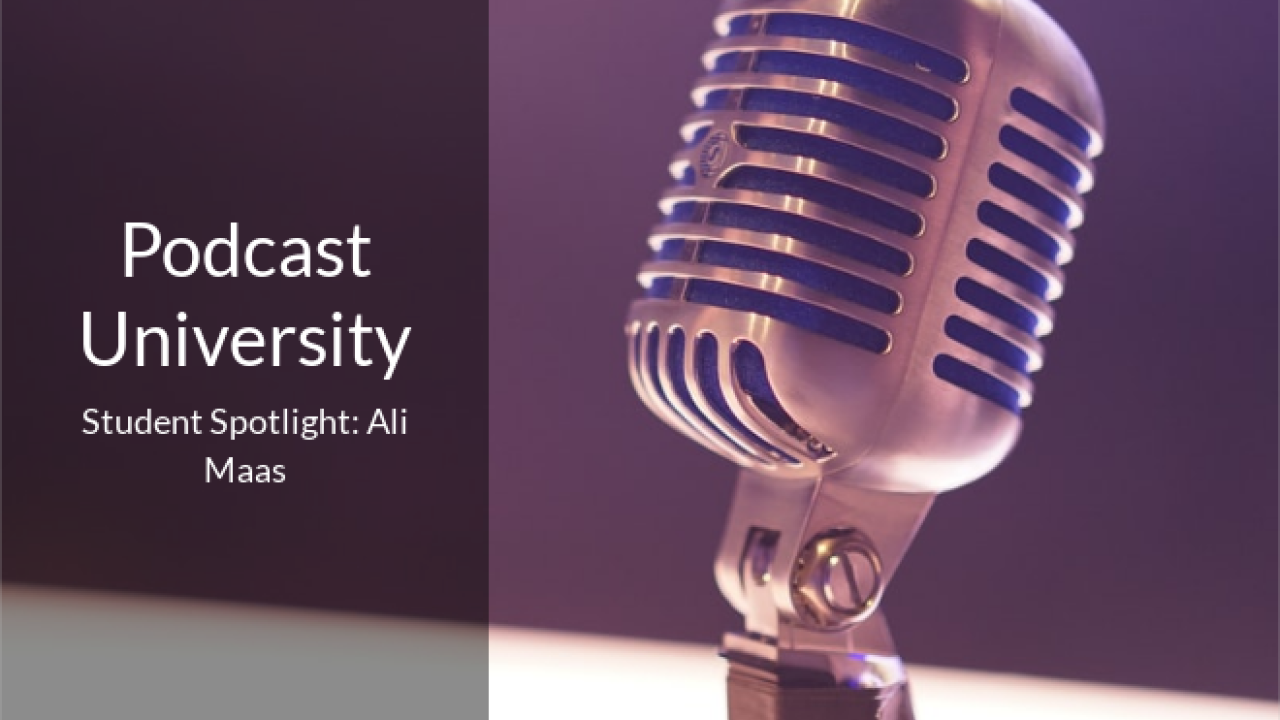
Podcast University Profile: Ali Maas
Welcome to “Podcast University: Sounding Stories from Across the Humanities,” a series highlighting podcasting projects by UC Davis graduate students, faculty, and staff. You can read previous articles in the series here and here.
In this installment of Podcast University, we profile Ali Maas, a PhD candidate in English who works at the intersection of oceanic studies, environmental humanities, and twentieth century literature. Ali is the host of California’s Eroding Coastline, a podcast exploring coastal erosion in California that she created during her time as a Bilinksy Fellow at the Bodega Bay Marine Lab. The Russell J. and Dorothy S. Bilinski Fellowships at Bodega Marine Laboratory funds interdisciplinary scholarship that “bridges the natural sciences, social sciences, and humanities.” Many of the projects funded by this fellowship have allowed scholars in the sciences to put their research in conversation with the humanities, but they have recently begun funding graduate students in the humanities who are interested in bringing the sciences into their projects.
California’s Eroding Coastline is a seven-part podcast series; each episode features a conversation with a scholar or activist whose work touches on coastal erosion. Her guests include researchers in History and the natural sciences as well as organizers with environmental nonprofits like the Surfrider Foundation. The goal of the podcast is to approach the same topic—California coastal erosion—from as many angles as possible in order to get a fuller picture of the issue and possible responses to it.
This project was Ali’s first foray into podcasting, and she learned a lot during the process. One of the benefits of podcasting for Ali is that it has a lot of built-in flexibility, something that has been especially important during the pandemic. While meeting people in person has been difficult in the last few years, the podcast format allowed Ali to talk to people from all over the world without risking exposure to COVID-19. However, hosting an interview podcast during the pandemic comes with its own challenges. Interviewees might live in a noisy house, have trouble finding childcare while recording, or have to cancel due to illness or caring duties. But Ali found that these complications also presented their own opportunities: “Podcasting is a medium that is uniquely suited to meeting people on a personal, human level, and that includes those moments where real life unexpectedly makes its way into the recording session.”
While podcasting does provide a certain measure of freedom compared to in-person events, it is not without complications. Coordinating multiple schedules takes time, as does preparing for interviews, recording, and editing. This is especially true for a podcast that features a different guest each episode. If you’re planning on starting your own podcast, Ali advises giving yourself more time than you think you need: “It’s easy to be ambitious and try to get one episode done every week, but if you give yourself more time to schedule, prepare, and edit, you’ll be less rushed and end up with a more rewarding experience and a better end product.”
For those planning to make a podcast related to their scholarly work, Ali suggests taking time in the planning phase to think not only about what you want to share with the world, but also what you want to get out of the process: “It’s important to make a podcast that you believe will be useful to others, but don’t forget to treat this process as an opportunity to become a better, more well-rounded scholar as well.”
In the future, Ali plans to use the knowledge, connections, and public humanities skills she gained while making her podcast to start a new collaborative interdisciplinary project. She is currently working on a proposal for a project that will bring together graduate scholars from across the humanities to create a digital narrative map of a specific area on the California coast. She hopes that this project will expand out from coastal erosion to address multiple intersecting forms of coastal crisis.
You can find Ali's podcast on SoundCloud and Apple Podcasts.
Have you ever thought about starting a podcast, or are you curious about their potential for public scholarship? Join PhD Unlimited on February 22 for an in-person, hands-on podcasting workshop featuring Amy Quinton, News and Media Relations Specialist and co-host of the UC Davis podcast Unfold. Amy will give us the backstory of Unfold and share advice on how to get started on a research-based podcast. Come familiarize yourself with the DHI’s podcasting equipment, workshop your ideas with facilitators and other attendees, and craft a production plan for your podcast. And don’t forget to stay tuned for the next installment of the Podcast University: Sounding Stories from Across the Humanities!
